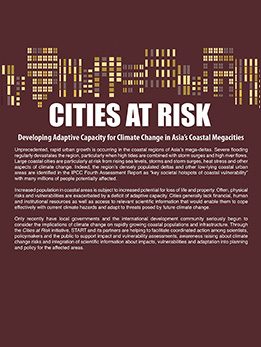Unprecedented, rapid urban growth is occurring in the coastal regions of Asia’s mega-deltas. Severe flooding regularly devastates the region, particularly when high tides are combined with storm surges and high river flows. Large coastal cities are particularly at risk from rising sea levels, storms and storm surges, heat stress and other aspects of climate change. Indeed, the region’s densely populated deltas and other low-lying coastal urban areas are identified in the IPCC Fourth Assessment Report as “key societal hotspots of coastal vulnerability” with many millions of people potentially affected.
Increased population in coastal areas is subject to increased potential for loss of life and property. Often, physical risks and vulnerabilities are exacerbated by a deficit of adaptive capacity. Cities generally lack financial, human and institutional resources as well as access to relevant scientific information that would enable them to cope effectively with current climate hazards and adapt to threats posed by future climate change.
Only recently have local governments and the international development community seriously begun to consider the implications of climate change on rapidly growing coastal populations and infrastructure. Through the Cities at Risk initiative, START and its partners are helping to facilitate coordinated action among scientists, policymakers and the public to support impact and vulnerability assessments, awareness raising about climate change risks and integration of scientific information about impacts, vulnerabilities and adaptation into planning and policy for the affected areas.



